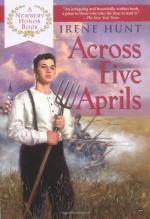|
|
Across Five Aprils Chapter 2
After the chores and the fieldwork are done, the family gets ready for dinner. At dinner, the Creightons and Cousin Wilse talk about some family matters--a death, weddings, births, happy things as well as tragedies. Gradually, the conversation turns to the war. Matt asks Wilse whether or not Kentucky will secede from the union. Wilse does not know, but he reminds Matt that southern Illinois where the Creightons live is closer to Missouri and Kentucky than it is to Chicago and northern Illinois. Matt admits that most of the people in southern Illinois are from the south like Missouri or Kentucky or Tennessee, but he opposes separation: "But this separation, Wilse, it won't do. We're a union; separate, we're jest two weakened, puny pieces, each needin' the other." Chapter 2, pg. 29
Wilse argues that the North has become rich while the South has become poor, and it has grown "arrogant toward the South." Although it is not common for a woman to jump into male conversations about politics, Ellen speaks up, reminding Wilse that there are slaves in the South who are "downtrodden" at which Wilse says that the South just wants to be left alone without any intervention. Tom is beginning to get angry at Wilse's words, and John once again brings up the issue of immorality of slavery. Wilse says that there has been slavery from the very beginning--from the founding of the nation. He also adds that even if slaves were freed, no northern white abolitionists would do anything to help them. The difference in the skin colors would not be forgotten.
For the first time, Bill speaks: "Slavery, I hate. But it is with us, and them that should suffer fer the evil they brought to our shores air long dead. What I want us to answer in this year of 1861 is this, John: does the trouble over slavery come because men's hearts is purer above the Mason-Dixon line? Or does slavery throw a shadder over greed and keep that greed from showin' up quite so bare and ugly?" Chapter 2, pg. 31 Wilse agrees with Bill immediately, saying that men are just as bad now as they were in ancient times, but Matt disagrees. He believes that human nature has become better over the years.
Jethro is silently frustrated. Before, he had been delighted at the thought of war which had given him the same feeling as watching a horse race or watching Shad beat a local bully. Stirring excitement in him, it had seemed to Jethro to give men "feeling of strength and fulfillment." But now, he is confused because he realizes that there is more to war than mere the excitement.
Wilse continues by saying that for every evil of slavery, there is an evil of industrialism in the North. The South only wishes to be left alone, but John interrupts him by again denouncing slavery. Bill turns on John by reminding him that they are from the South; they shouldn't have northern abolitionists like William Lloyd Garrison as teachers. When tension fills the air, Ellen stops the conversation, ordering that there will be no more talk of war.
After dinner, Nancy and John go home with their boys. Jenny and Bill clear up the dishes in the kitchen while the rest of the family is out in the dooryard. Jethro falls asleep beside his father, and the family waits for Shad to return from town.
When Shad comes, he tells the family that the Confederates fired on Fort Sumter on Friday morning. Anderson's men at Fort Sumter had been starving, and the President had announced that provisions would be sent. The Confederates demanded that the fort be surrendered, but when this was refused, they had fired. Anderson had held out with his men before surrendering to a Southern general named Beauregard. People had climbed up on their rooftops to watch the fighting as though they were spectators in a circus. Shad says that it is not war yet because the Congress is not in session to declare it, but the President has asked for volunteers from all the states to join the militia. Matt says slowly that regardless of what the Congress will do, it is war.




